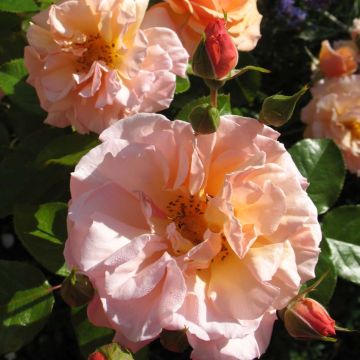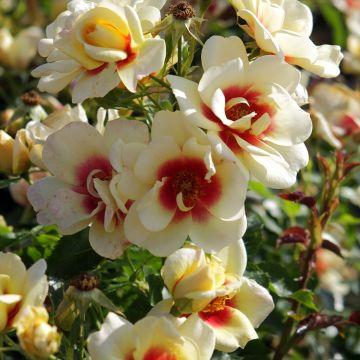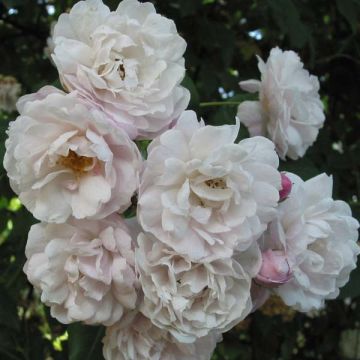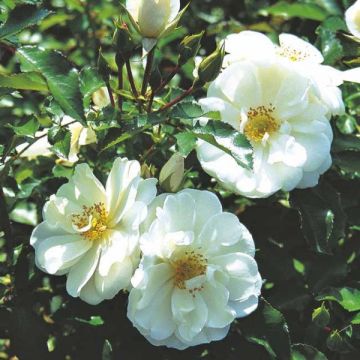

Rosier à grandes fleurs Womanity
Rosa Womanity
Rosa Womanity
The rose bush purchased as bare roots seems healthy to me. Planted in the ground, I hope to have better luck than last year (rose bush died). So now I'm waiting for it to take... (or not?).
Thierry, 13/11/2025
Special offer!
Receive a €20 voucher for any order over €90 (excluding delivery costs, credit notes, and plastic-free options)!
1- Add your favorite plants to your cart.
2- Once you have reached €90, confirm your order (you can even choose the delivery date!).
3- As soon as your order is shipped, you will receive an email containing your voucher code, valid for 3 months (90 days).
Your voucher is unique and can only be used once, for any order with a minimum value of €20, excluding delivery costs.
Can be combined with other current offers, non-divisible and non-refundable.
Home or relay delivery (depending on size and destination)
Schedule delivery date,
and select date in basket
This plant carries a 6 months recovery warranty
More information
We guarantee the quality of our plants for a full growing cycle, and will replace at our expense any plant that fails to recover under normal climatic and planting conditions.
Description
Rosa Womanity is a beautiful rose created by Dorieux. It is the perfect choice for enthusiasts of large, highly scented classic roses. It is a vigorous bush with disease-resistant foliage that produces large, beautifully rounded, double flowers in a pure pink hue. It blooms all summer in successive waves. This stylish variety is ideal for decorating flower beds and creating beautiful bouquets.
Rosa Womanity has a strong rate of growth. In just a few years, it forms an upright bush with thorny stems, 75cm (30in) in height and 60cm (24in) in spread, adorned with disease-resistant shiny dark green foliage. It flowers abundantly from June to October. Its 8 to 9cm (3 to 4in) wide roses are double and solitary, borne on long stems. The tightly closed buds open into turbinate roses. The petals have a solid and intense pink colour that holds up well in the sun. They are highly fragrant. The deciduous foliage falls in autumn.
Bush roses with large flowers are perfect in flower beds, planted in groups, or mixed with smaller shrubs. Combine them with weigelas, abelias, caryopteris, and peonies, for example. They are great companions for paniculate phlox and tall gypsophila. The modest size and resilience of Womanity make it ideal for all gardens, even small ones. It also works well grown in large pots. Its uses are diverse, according to each gardener's desires. It looks wonderful in a monochrome rose flower bed, or alongside white, mauve, or purple varieties. It pairs well with light and easy-to-grow plants such as perennial geraniums (Geranium 'Blue Cloud', G. 'Anne Folkard', 'Nimbus', 'Orion'), bellflowers (lactiflora, rapunculoides), catmints, love-in-a-mist, foxgloves, and phlox, etc. Its flowers are perfect for creating elegant bouquets that will beautifully scent the house.
Report an error about the product description
Rosa Womanity in pictures
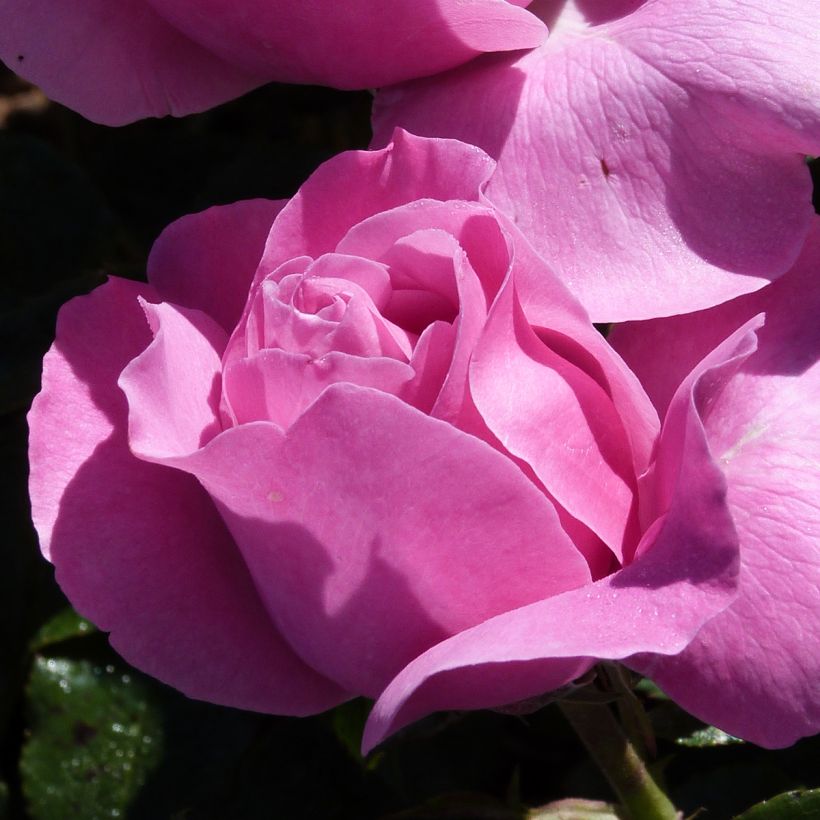

Plant habit
Flowering
Foliage
Botanical data
Rosa
Womanity
Rosaceae
Cultivar or hybrid
Planting and care
Plant Rosa 'Womanity' from November to March, in ordinary, well-prepared, and well-drained soil. Roses prefer clayey soils rather than light ones. In excessively sandy, compact, or dry summer soil, it is advisable to incorporate potting soil or decomposed manure or compost at the bottom of the planting hole. However, this rose fears waterlogged soil in winter. Place it in a sunny location, preferably in partial shade. Roses are hungry plants, so a specific fertiliser will be beneficial at the start of its growth, and regularly throughout the flowering period.
Regularly remove faded flowers to encourage new blooms.
In late winter, prune the stems to about one quarter of their length (from 4 to 6 buds from the base of the stem). Always prune above an outward-facing bud, so that the shrub can bush out and the branches do not become tangled in the centre.
Planting period
Intended location
Care
-
, onOrder confirmed
Reply from on Promesse de fleurs
Similar products
Haven't found what you were looking for?
Hardiness is the lowest winter temperature a plant can endure without suffering serious damage or even dying. However, hardiness is affected by location (a sheltered area, such as a patio), protection (winter cover) and soil type (hardiness is improved by well-drained soil).

Photo Sharing Terms & Conditions
In order to encourage gardeners to interact and share their experiences, Promesse de fleurs offers various media enabling content to be uploaded onto its Site - in particular via the ‘Photo sharing’ module.
The User agrees to refrain from:
- Posting any content that is illegal, prejudicial, insulting, racist, inciteful to hatred, revisionist, contrary to public decency, that infringes on privacy or on the privacy rights of third parties, in particular the publicity rights of persons and goods, intellectual property rights, or the right to privacy.
- Submitting content on behalf of a third party;
- Impersonate the identity of a third party and/or publish any personal information about a third party;
In general, the User undertakes to refrain from any unethical behaviour.
All Content (in particular text, comments, files, images, photos, videos, creative works, etc.), which may be subject to property or intellectual property rights, image or other private rights, shall remain the property of the User, subject to the limited rights granted by the terms of the licence granted by Promesse de fleurs as stated below. Users are at liberty to publish or not to publish such Content on the Site, notably via the ‘Photo Sharing’ facility, and accept that this Content shall be made public and freely accessible, notably on the Internet.
Users further acknowledge, undertake to have ,and guarantee that they hold all necessary rights and permissions to publish such material on the Site, in particular with regard to the legislation in force pertaining to any privacy, property, intellectual property, image, or contractual rights, or rights of any other nature. By publishing such Content on the Site, Users acknowledge accepting full liability as publishers of the Content within the meaning of the law, and grant Promesse de fleurs, free of charge, an inclusive, worldwide licence for the said Content for the entire duration of its publication, including all reproduction, representation, up/downloading, displaying, performing, transmission, and storage rights.
Users also grant permission for their name to be linked to the Content and accept that this link may not always be made available.
By engaging in posting material, Users consent to their Content becoming automatically accessible on the Internet, in particular on other sites and/or blogs and/or web pages of the Promesse de fleurs site, including in particular social pages and the Promesse de fleurs catalogue.
Users may secure the removal of entrusted content free of charge by issuing a simple request via our contact form.
The flowering period indicated on our website applies to countries and regions located in USDA zone 8 (France, the United Kingdom, Ireland, the Netherlands, etc.)
It will vary according to where you live:
- In zones 9 to 10 (Italy, Spain, Greece, etc.), flowering will occur about 2 to 4 weeks earlier.
- In zones 6 to 7 (Germany, Poland, Slovenia, and lower mountainous regions), flowering will be delayed by 2 to 3 weeks.
- In zone 5 (Central Europe, Scandinavia), blooming will be delayed by 3 to 5 weeks.
In temperate climates, pruning of spring-flowering shrubs (forsythia, spireas, etc.) should be done just after flowering.
Pruning of summer-flowering shrubs (Indian Lilac, Perovskia, etc.) can be done in winter or spring.
In cold regions as well as with frost-sensitive plants, avoid pruning too early when severe frosts may still occur.
The planting period indicated on our website applies to countries and regions located in USDA zone 8 (France, United Kingdom, Ireland, Netherlands).
It will vary according to where you live:
- In Mediterranean zones (Marseille, Madrid, Milan, etc.), autumn and winter are the best planting periods.
- In continental zones (Strasbourg, Munich, Vienna, etc.), delay planting by 2 to 3 weeks in spring and bring it forward by 2 to 4 weeks in autumn.
- In mountainous regions (the Alps, Pyrenees, Carpathians, etc.), it is best to plant in late spring (May-June) or late summer (August-September).
The harvesting period indicated on our website applies to countries and regions in USDA zone 8 (France, England, Ireland, the Netherlands).
In colder areas (Scandinavia, Poland, Austria...) fruit and vegetable harvests are likely to be delayed by 3-4 weeks.
In warmer areas (Italy, Spain, Greece, etc.), harvesting will probably take place earlier, depending on weather conditions.
The sowing periods indicated on our website apply to countries and regions within USDA Zone 8 (France, UK, Ireland, Netherlands).
In colder areas (Scandinavia, Poland, Austria...), delay any outdoor sowing by 3-4 weeks, or sow under glass.
In warmer climes (Italy, Spain, Greece, etc.), bring outdoor sowing forward by a few weeks.


































